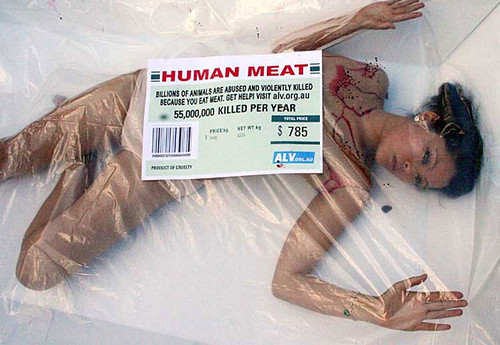If there is any justice beyond human justice, the human race should be eliminated yesterday.
 |
| Picture of a symbolically tortured animal (homo sapiens “sapiens”) |
Animal welfare activists don’t shy away from coining their message in radical slogans. We all know horror stories of illegal PETA activists setting fire to legitimate pork factories or chicken breeding facilities, and we shiver at the idea that such terrorists are allowed to publish their campaigns in our magazines. What are they fighting for, anyway? There is nothing remotely comparable to human desolation and misery hiding under a pig’s hide, is there?
Compassion with animals is as ludicrous as compassion with a person on a photo, or a character in a fictitious movie. The screams of these beasts are mere mechanical noises like the cracking of a rock or the roar of a river; their gaze is but a numb reflection of the outer world; their heartbeat – meaningless pounding, functional only to the production of meat, leather and other “consumer goods”.
Is that it? Is that an adequate statement of our relationship to animals, at least the ones we don’t choose to be our mates and pets? It is clearly the implicit view of the vast majority of human societies that have existed on this planet. Sacredness of animals, as some religions have it, is either an application of the abstract principle of the sanctity of all life, or a corollary of a religious association with a deity.
Recently I read Jonathan Safran Foer’s excellent 2009 book “Eating Animals”. Based on three years of research, the famed New York writer blends the stories of slaughterhouse murder witnesses, PETA activists and small alternative family farmers with philosophical anthropological observations about how we remember and the role food (and hence, meat) plays in this. The pivotal question of his book, he says, is “Should we or should we not eat turkey at Thanksgiving?”
I am not going through the arguments pro and contra in this article. Everybody has to sort that out for themselves. You will have to go through unpleasant questions of what it means to be human, about the essence of suffering and pain, stewardship and responsibility. Read, watch, observe as many videos of factory farming (readily available on youtube) as you can digest and decide if you will digest the meat of these corporations. To give you a hint, look for “Smithfield”, the #1 producer of pork in the US, chicken giant “Tyson foods” (a major supplier of KFC), Temple Grandin (non humans torturing and killing facilities corporation), or Gail Eisnitz’s book “Slaughterhouse”.
Safran Foer compares a complete vegan lifestyle with the idea of being a selective omnivore, because he used to be one of the latter. Of course, it is good to decide consistently not to eat any factory farmed meat while eating “responsible” meat, but is it a commendable attitude in the long run? I find this a difficult question, a strong test for philosophical pragmatism. Foer mentions a vegan who is building more humane slaughterhouses (that are inflicting less pain). If we offer a sustainable alternative to factory farming that doesn’t torture, vivisect, force feed, brand, genetically manipulate into cripples, and deny basic “species-specific” needs to animals that surely is a good thing and helps consumers make the transition to eating better.
Eventually, with 7 billion people on the planet and counting (and more and more of them counting on a meat diet), it will be impossible to feed everyone a meat-rich diet without rendering the planet ultimately inhabitable. Already, meat production is contributing 40% more to global warming than all transportation combined. Vast areas of farmland are needed to produce food for the animals, and with depleting freshwater resources this amounts to sheer madness. If we are to survive and live long and happy lives as we have gotten used to, we need as humanity to lower meat consumption dramatically.
I beg you pardon for this frag-men-ted account of the topic. What have I just written? It has something to do with global warming, oh yeah, and there was some argument with pain did I miss that? He mentioned the word “slaughterhouse” somewhere, how unappetizing. What were the names of the culprit corporations again? And in the end it was all just philosophy, wasn’t it?
I would much rather hit a hairy gorilla fist hard on your table and decree “Enough you damned fools!”
If you haven’t seen the documentaries “We Feed the World”, “Supermarket Secrets”, or “Food, Inc.” yet, I can recommend you to watch it and would be glad if this small article was helpful.